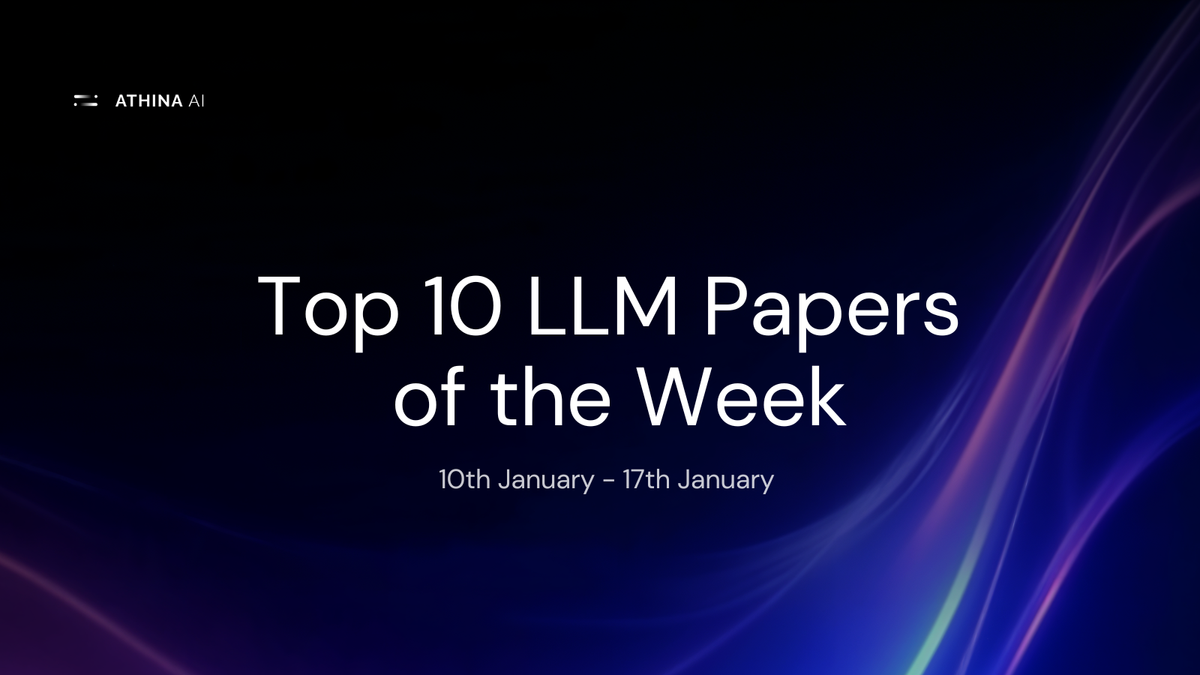Top 10 LLM Papers of the Week: 10 Jan - 17 Jan

As January unfolds, the excitement in Artificial Intelligence remains at an all-time high, with Large Language Models (LLMs) and AI agents driving transformative advancements. This week, a new wave of groundbreaking research emerges, focusing on AI Agents, LLM Benchmarking, and Retrieval-Augmented Generation (RAG). In this article, we highlight 10 Cutting-Edge Research Papers from these Fields, breaking down their insights, exploring their implications, and showcasing their role in shaping the future of AI.
1) SteLLA: A Structured Grading System Using LLMs with RAG
This study introduces SteLLA, a grading system leveraging Large Language Models (LLMs) and Retrieval Augmented Generation (RAG) to improve automated short answer grading (ASAG). By integrating instructor-provided reference answers and rubrics, SteLLA extracts structured knowledge and uses LLMs for detailed evaluation, delivering analytical grades and feedback.
Why it Matters:
This study advances the use of LLMs in education by creating a scalable and reliable grading system that supports educators with detailed and structured assessments, potentially improving feedback quality for students.
2) Potential and Perils of LLMs as Judges of Unstructured Textual Data
This study explores using LLMs as judge models to evaluate the thematic accuracy of summaries generated by other LLMs from survey responses. Testing with various LLMs and comparing to human evaluations, the research finds that LLMs as judges provide scalable alternatives but struggle with subtle, context-specific nuances. Metrics like Cohen’s kappa and Krippendorff’s alpha validate this approach’s reliability.
Why it Matters:
The study highlights a scalable method for evaluating AI-generated summaries, supporting organizations in text analysis while cautioning about potential misrepresentations in nuanced contexts.
3) Agentic Retrieval-Augmented Generation: A Survey on Agentic RAG
Agentic Retrieval-Augmented Generation (Agentic RAG) enhances traditional RAG systems by incorporating autonomous AI agents to handle dynamic retrieval, multistep reasoning, and complex task management. Using reflection, planning, tool use, and collaboration, Agentic RAG adapts workflows for greater flexibility and context awareness. This survey explores its principles, architectures, applications, and challenges, offering insights into real-world implementation.
Why it Matters:
Agentic RAG represents a major leap in AI's ability to handle complex, real-time tasks across industries, providing scalable and adaptive solutions while addressing ethical and performance concerns.
4) Authenticated Delegation and Authorized AI Agents
This study proposes a framework for secure delegation of authority to autonomous AI agents, enabling authenticated, authorized, and auditable task delegation. It extends OAuth 2.0 and OpenID Connect with agent-specific credentials and natural language permission translation, ensuring robust access control and accountability while leveraging existing authentication infrastructure.
Why it Matters:
The framework addresses critical security and accountability concerns, allowing safe deployment of AI agents in digital spaces while minimizing risks and unlocking their full potential for task automation.
5) Enhancing Human-Like Responses in Large Language Models
This paper examines techniques to make LLMs more human-like by improving language understanding, conversational coherence, and emotional intelligence. Methods like diverse dataset fine-tuning and human reasoning integration enhance user interactions and expand AI application possibilities, while future work focuses on ethical concerns and biases.
Why it Matters:
Advancing human-like AI interactions can revolutionize domains like customer support and education, but addressing ethical challenges ensures responsible and equitable deployment.
6) WebWalker: Benchmarking LLMs in Web Traversal
This paper introduces WebWalkerQA, a benchmark to evaluate LLMs' ability to navigate websites and extract layered, high-quality information. It also proposes WebWalker, a multi-agent framework using an explore-critic paradigm for human-like web traversal, enhancing RAG systems for complex, real-world tasks.
Why it Matters:
WebWalkerQA advances LLM capabilities by addressing limitations in retrieving nuanced data, enabling better performance in applications requiring deep, systematic web navigation.
7) HALoGEN: Fantastic LLM Hallucinations and Where to Find Them
The HALoGEN benchmark assesses hallucinations in generative LLMs across nine domains, offering 10,923 prompts and automated verifiers that break down and validate generated outputs against reliable sources. Evaluating ~150,000 generations from 14 models, the study highlights pervasive hallucinations and introduces a classification system to pinpoint their origins (e.g., memory errors, faulty training data, or fabrication).
Why it Matters:
HALoGEN enables systematic analysis of hallucinations, guiding the development of more accurate and trustworthy LLMs for diverse applications.
8) Multiagent Finetuning: Self Improvement with Diverse Reasoning Chains
This study introduces a multiagent approach to LLM self-improvement, where independently fine-tuned models interact to generate diverse, specialized training data. By training on separate datasets from multiagent interactions, the system achieves prolonged improvement and diverse reasoning chains, outperforming single-agent methods across various reasoning tasks.
Why it Matters:
The multiagent framework enhances LLM specialization and scalability, offering a robust path for sustained performance gains in complex reasoning and decision-making tasks.
9) A Multi-AI Agent System for Autonomous Optimization of Agentic AI Solutions via Iterative Refinement and LLM-Driven Feedback Loops
This paper presents a framework for autonomously optimizing Agentic AI systems using specialized agents for Refinement, Execution, Evaluation, Modification, and Documentation. Powered by Llama 3.2-3B, the system uses iterative feedback loops to optimize configurations without human input, demonstrating significant performance improvements in dynamic, real-world applications across various industries.
Why it Matters:
The framework advances scalable and adaptable Agentic AI systems, reducing manual intervention while improving efficiency and quality, making it a transformative solution for complex workflows.
10) PC Agent: While You Sleep, AI Works – A Cognitive Journey into Digital World
PC Agent is an AI system designed to handle complex digital tasks by learning from human cognitive processes during computer use. It introduces PC Tracker for collecting human-computer interaction data, a two-stage pipeline to enrich this data with cognitive context, and a multi-agent system for planning and execution. Experiments show that with just 133 cognitive trajectories, PC Agent can handle intricate, multi-step tasks like creating PowerPoint presentations.
Why it Matters:
This approach demonstrates how leveraging human cognitive data can train efficient and capable digital agents, paving the way for advanced AI tools that assist with complex real-world work.
Conclusion
As we move further into January, this week’s featured papers highlight significant advancements in AI Agents, LLM Benchmarking, and Retrieval-Augmented Generation (RAG). From improving multi-agent collaboration to refining evaluation methods and enhancing real-time information retrieval, these studies mark critical progress in making AI systems more capable and reliable.
For insights from the Top 10 Papers from the Past Two Weeks, click here.
Looking to streamline your AI development? Explore Athina AI — the ideal platform for building, testing, and monitoring AI features tailored to your needs.



